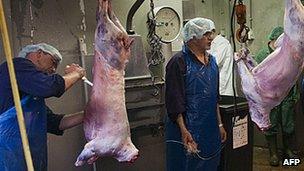Leading vet criticises ritual slaughter of animals
- Published

A leading vet has criticised the "unacceptable" rise in the number of animals killed in ritual slaughter.
Ritual slaughter is lawful in the UK and the EU to satisfy the dietary requirements of Jews and Muslims.
Prof Bill Reilly, former president of the British Veterinary Association, said estimates suggested more animals were slaughtered than was necessary.
The Food Standards Agency (FSA) said its own figures showed most animals were stunned before being killed.
The FSA conducted a survey into animal welfare in slaughterhouses in September.
A spokesman said: "The results indicate that the number of animals not stunned prior to slaughter is relatively low, accounting for 3% of cattle, 10% of sheep and goats, and 4% of poultry.
"They also show that the majority of animals destined for the halal trade in both the red and white meat sectors are stunned before slaughter."
The FSA said full details of the survey would be published ahead of a discussion at a board meeting on 22 May.
'Not acceptable'
But Prof Reilly, writing in the Veterinary Record, said: "In my view, the current situation is not acceptable and, if we cannot eliminate non-stunning, we need to keep it to the minimum.
"This means restricting the use of halal and kosher meat to those communities that require it for their religious beliefs and, where possible, convincing them of the acceptability of the stunned alternatives."
He suggested some abattoirs might be refusing to stun animals simply to cut costs.
UK legislation allows halal (Muslim) or shechita (Jewish) "non-stun" slaughter as long as it does not cause "unnecessary suffering".
But Prof Reilly said he witnessed shechita slaughter in the 1970s and he wrote: "The distress, fear and pain were there for all to see in the abattoir."
Prof Reilly said his own estimates suggested around two million animals, mostly poultry, were killed in the UK each year without stunning for the orthodox Jewish community.
Halal meat now accounted for 25% of the entire UK meat market, Prof Reilly added. Anecdotal evidence suggested that almost half of lambs destined for slaughter were killed without prior stunning.
Under Jewish and Islamic law, animals for slaughter must be healthy and uninjured at the time of death, which rules out driving a bolt into the brain - though some Muslim authorities accept forms of stunning that can be guaranteed not to kill the animal.
Both faiths adhere to a one-cut method of slaughter and insist it is humane because the animal quickly loses consciousness, bleeding to death.
Shimon Cohen of Shechita UK said Prof Reilly's "deeply flawed" article appeared to have been based on discredited science.
"The fact is there is no conclusive scientific evidence to support his arguments at all," Mr Cohen said.
"If he is truly concerned about animal welfare, his time would be better spent campaigning against the so called 'humane' methods of mechanical stunning including captive bolt shooting, gassing, electrocution, drowning and clubbing, not to mention the many millions of animals who are 'mis-stunned' every year."
Ruksana Shain, founding director of behalal.org, said Prof Reilly's claim that halal meat accounted for a quarter of the UK's meat market was factually incorrect and that his anecdotal evidence on the slaughter of lambs was "not backed by anything from research".
Dr A Majid Katme, from the Islamic Medical Association, said it was a "myth" that proper religious slaughter without stunning was painful and cruel and that scientists had not agreed on its effect.
Dr Katme said electrical stunning could weaken an animal's heart, meaning more blood stayed inside their body after slaughter, which he said was forbidden by Islam.
"It is arrogant for someone who is not a Muslim to presume that he can teach us the practice of our faith," he said.
Joyce D'Silva, from the charity Compassion in World Farming (CWF), said: "Judaism and Islam believe that animals are creatures of God; science tells us that they are sentient beings, who can suffer.
"If you hold either view, or both, then your principal concern must be to ensure the least possible suffering for the animal concerned.
"Therefore animals should be handled with care and stunned effectively before their throats are cut in order to minimise their distress and pain.
"Consumers should be able to tell how the animals they eat are reared, transported and slaughtered," he added.
- Published14 December 2011
- Published30 November 2011
- Published30 November 2011